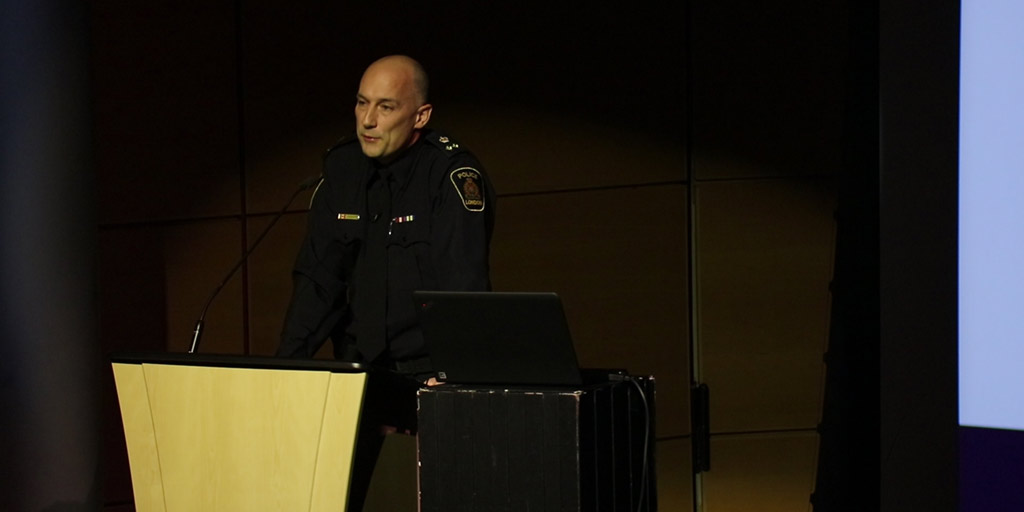LPS and OPP host public fentanyl education session
 CREDIT: JORDAN CROW
CREDIT: JORDAN CROWCREDIT: JORDAN CROW Deputy Police Chief Daryl Longworth speaking at the fentanyl education session at the Wolf Performance Hall.
On Jan. 17, the London Police Service (LPS) and Ontario Provincial Police (OPP) hosted an education session for the public on fentanyl and other opioids, at the Wolf Performance Hall.
The four presentations gave members of the public the opportunity to learn more about the current opioid crisis in the city as well as how to help those who may be addicted to these types of drugs. The educational session happened in wake of three deaths and two hospitalizations in the city, which the LPS strongly suspect are related to drug overdoses.
Fentanyl is a pain medication 100 times more potent than morphine. It is a white powder that can also be mixed with other drugs such as cocaine and heroin. According to statistics from Deputy Chief Daryl Longworth's portion of the presentation, in 2016, there were 11 deaths in London that were confirmed to be attributed to fentanyl. In 2017, there were four confirmed deaths and four others that the LPS suspect were related but do not have the lab results yet.
“Tonight's message and presentations were all about prevention, educating the public and developing some public awareness about this very serious issue that is threatening our community,” Longworth said.
Two weeks prior to the education session, Longworth explained that the LPS received lab results back from Health Canada, which showed that crack cocaine that had been seized in London Ont. had traces of fentanyl in it.
“[�] It is our hope that you will leave here armed with some information and some tools that you can share with your kids, your friends and your loved ones to help stop what can essentially be a game of Russian roulette. When you buy drugs on the street, you are taking at face value that what the dealer is holding out is what he says it contains, and nothing else, nothing more and nothing that is going to harm you. Do you really want to take that risk?” Longworth said.
In regard to solving the issue of drugs in the community, Longworth said that police enforcement alone will not be able to accomplish this. “Fentanyl and illicit opioid use is a community issue that we all have to work together to solve,” Longworth said.
Shaya Dhinsa, Manager of Sexual Health at the Middlesex-London Health Unit, said that some signs and symptoms that someone is having an overdose can range from: slow or absence of breathing, blue finger nails or lips, limp body, pinpoint pupils, deep snoring/gurgling sound, vomiting, loss of consciousness or unresponsive to stimuli (shake and shout).
Naloxone, also known as Narcan, is a medication that reverses the effects of an opioid overdose and can save lives. “Naloxone is available in many different places around the city. You can get it from a pharmacy. If you do get it from a pharmacy, it is free but it is injectable. If you get it from places like the Middlesex-London Health Unit or Addiction Services of Thames Valley (many other community service organizations are now dispensing it) it is a nasal spray that is very easy to use,” Christine Garinger, co-ordinator of the Community Withdrawal and Crisis Support program of Addiction Services of Thames Valley said.
The presentation concluded with a question and answer period.














